As a life coach, you have a sacred calling and a desire to make a difference in the lives of others. But someone sold you a lie…
The lie that you need the latest, most complicated technology to start and grow a successful coaching business.
The truth is, as the world becomes more and more digital, technology can help you connect with your ideal client more easily. Afterall, meeting them where they are (online) is important!
This guide will help you create a great coaching website with ease and simplicity!
What our Complete Coaching Website Guide Will Cover:
Why Create a Coaching Website? (5 benefits)
How to Create a Coaching Website (2 steps if you’re starting from scratch)
The Foundation: What a Coaching Website Actually Needs (must-have pages)
Top Tips for the Best Coaching Website
10 Inspiring Examples of Great Coaching Websites (and why they work)
Strategies to Promote Your Website & Get More Clients
5 ChatGPT Prompts to Help You Create Your Coaching Website
The Next Step to Attract More of Your Dream Coaching Clients

Why Create a Coaching Website At All?
Consider your website an extension of your business. Most coaches don’t have a brick-and-mortar business, so a website is the channel to communicate a clear message about who you are and what you offer.
Here are 5 reasons your coaching business will benefit from a good coaching website:
- Professional Credibility: A website is often the first point of contact for potential clients. A professional online presence can build trust in your expertise and approach.
- 24/7 Visibility: A website ensures that information about your services is available around the clock. Clients can find you no matter where you are or whether you’re working or not.
- Brand Building: Websites are powerful tools for personal brand development. You can showcase your unique approach, share testimonials, publish valuable content, and highlight your accomplishments.
- More Clients: A website makes it easier for potential clients to find you when searching for information or services online. It also lets you collect contact information and provide value to improve long-term relationships with your potential clients.
- Resource Hub: A website can act as a central hub for resources. It can offer your clients downloadable content, online booking for sessions, detailed descriptions of coaching programs, and other resources.
With that, let’s dive into creating a website with ease (no matter how technologically challenged you might consider yourself!)
How Do You Create a Coaching Business Website?
(If you already have a website, move on to the next section: The Foundation)
But if you’re just dipping your toes in, let me show you how easy it can be to give your business a place in the digital space.
Step 1: Register Your Life Coaching Business Domain Name
First, let’s talk about the difference between your domain and your domain extension.
A domain extension helps categorize your website (.com/.edu/.org/.gov/etc.). Most businesses use “.com” while a non-profit organization would likely use “.org”.
Your domain name is the name or words potential clients will use to recognize your particular coaching business website.
For example, you can find us at www.bravethinkinginstitute.com. “Bravethinkinginstitute” is our domain name and “.com” is our domain extension.
Choose Your Hosting Provider
If your domain name is your address (how people find you), think of hosting as the land your house will be built on. It’s your little piece of internet real estate that you’ll pay an annual fee to use.
You can purchase your domain and pay for hosting from places like godaddy, siteground, and bluehost. I highly recommend registering your domain and buying hosting from the same provider, for ease.
Pretty simple, right?
Your domain name should be easy to spell and remember. Avoid complex spellings, numbers, or hyphens that might confuse potential clients. A simple and straightforward domain name helps ensure that people can recall and find your website easily.
Using your name can have benefits, including:
- Personal Branding: Using your name for your domain establishes and reinforces your personal brand. This can be particularly effective in industries like life coaching, where trust and personal connection are key.
- Professionalism and Credibility: A domain name based on your real name suggests a personal commitment to your work. And, it can enhance your credibility as an individual expert in your field.
- Long-Term Flexibility: Using your name provides flexibility for the future. If you decide to shift your focus within coaching or expand your services, your domain name will still be relevant. It’s not tied to a specific niche or service, so it can grow and evolve with your career.
- Ease of Search: If potential clients are likely to search for you by name, having a domain name that matches can improve your search visibility.
- Availability: Depending on how common your name is, it might be easier to find an available domain that matches. More generic coaching-related terms are likely to be already taken by another website.
Whether you choose to use your name or something different, your domain name should ideally reflect your coaching niche or personal brand.
It’s an opportunity to convey something about your coaching style or the specific area you specialize in, such as “EmpowermentLifeCoaching.com” or “MindfulGrowthCoach.com”. This can help attract the right audience and set clear expectations about the services you offer.
Step 2: Choose Your Website Platform
Your website platform is like choosing a homebuilder.
Luckily, most website platforms have coaching website templates and designs that you can manage and edit with ease. Many of these platforms also have the option of easy-to-use, drag and drop website builders.
Some of the easiest to begin with are:
- WordPress.org (which calls their templates “themes”)
- Squarespace.com
- Weebly.com
- Wix.com
Make Time and Delegate as Needed
Building a website isn’t a “one and done” project. I recommend dedicating a little bit of time each week making sure it’s running smoothly. Maintenance includes keeping your website updated, adding new services or offers, adding your most recent client testimonials, and so on.
You might also consider hiring a virtual assistant or web designer to set up your website. They can take care of everything from designing a beautiful homepage to creating custom pages and forms.
And once you have your groundwork done, you’ll be ready to move on to the foundation!
The Foundation: What a Coaching Business Website Actually Needs
Before building a house, there must be a solid foundation in place. The same goes for your coaching business website.
For your potential clients to be able to find your website, first get to know Google.
Why Google?
Google dominates as the search engine with the highest traffic volume. And it’s by a huge margin. Google boasts about 75% of traffic while the second most popular search engine – Amazon – sits at 11%.
Why is this important?
The more optimized your website is for search engines like Google, the more likely it is for people to find your website.
Most SEO (Search Engine Optimization) experts recommend including the following elements on any website:
Essential Coaching Business Website Pages
To make it easy to navigate, a coaching business website usually has the following pages:
- Home: This is where your users will immediately land when they find your website. It’s important for this page to be clear and have a flow visitors can follow down the page.
- About: A page dedicated to your professional experience and your personal background. The main goal for this page is to establish credibility and build rapport with your web visitors. This is where you would discuss your coaching philosophy, signature story, and credentials with your visitor.
- Coaching Services: This page will showcase your offers, programs, and all the different ways your potential clients can work with you. This is where you highlight the benefits of working with you and the outcomes they can expect.
- Testimonials: One of the best ways to build credibility is to have a page full of client reviews. If you haven’t worked with your first coaching client yet, you can add these as you gain experience.
- Blog: Blogging is a great way to grow your coaching business. Blogging is simply creating relevant, valuable content for a coaching website. Your posts could be written in the form of articles, videos from other platforms like youtube, or even podcast recordings. When done intentionally and strategically, you’ll attract higher traffic to your website.
- Contact: This page invites people to reach out to you. You could ask your visitor to click a link to a scheduling calendar, to send an email, or call your business phone number. Be sure to add where they can follow you on social media, too!
While there are other pages you can add to your website as your coaching business grows, these essentials will get you up and running.
Tip: Before you launch, check your footer content. Your footer is the space anchored to the bottom of every page and usually includes:
- Navigation Links (like a mini menu to guide your visitor through your website)
- Copyright Statement (declares ownership of your website content)
- Social Media Links or Icons (makes it easy for people to connect with you on multiple platforms)
- Link to Terms of Use Page (establishes a liability agreement that your website visitor must abide by in order to use your website or services)
>>> Want to deep dive even further into how to craft a compelling, growth-driving coaching website? Check out this post to fine tune your site to get more clients.
Top Tips to Create Your Own Life Coach Website
- Check out other websites that are familiar and relevant to your business. By going to the websites you connect with, you’ll naturally find inspiration for how you’d like your coaching business website to look and feel. You can browse our website and blog as an easy starting point!
- Sketch out your website design and how you want each page to look. By drafting out how you want things to flow on pen and paper, you’ll have more direction and intention in your website design.
- Use your target avatar for every decision you make in your website design. (Don’t know your target audience yet? Click here for our client avatar guide) Think about how each piece builds your KNOW-LIKE-TRUST factor and guides your user through your page. Your website should make it clear who you work with and how you help them.
- Make sure your images are the right size. High-quality images can take up a lot of bandwidth and slow down your website. Thankfully, there are WordPress plug-ins like ShortPixel that can compress and optimize your images and videos (for example, you can set videos to autoplay) so your website loads faster without decreasing the quality of your content.
- Learn how to generate extraordinary testimonials from clients and use them on your website.
- Embrace what makes you different! I encourage you to believe in what makes you unique and how you provide value with your gifts. When you lean into who you are and how you serve in your own way, you’ll be unfazed by a saturated market.
10 Life Coaching Websites to Inspire You
For a clean, polished website with a remarkable home page: Marie Forleo – host of MarieTV, entrepreneur and philanthropist
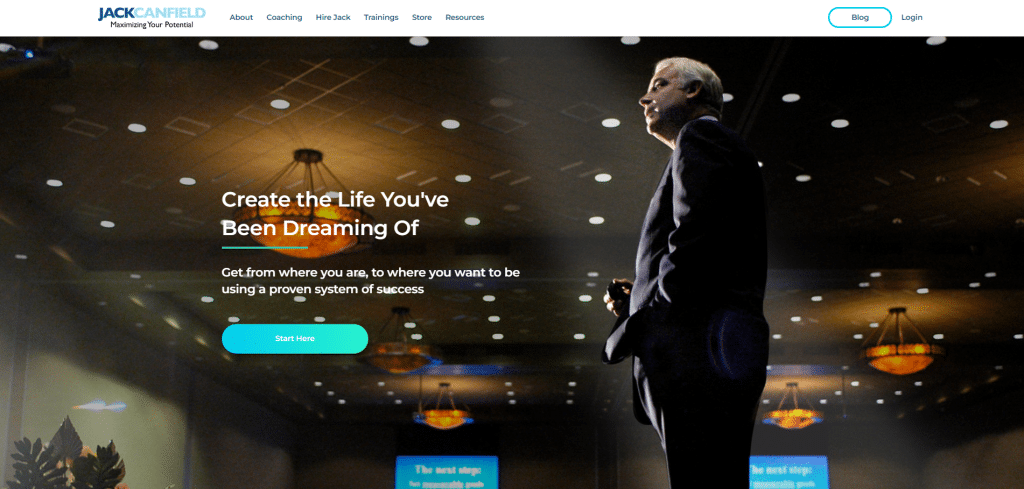
A great example of a clear call-to-action and a tasteful opt-in: Jack Canfield: Maximizing Your Potential | Jack Canfield
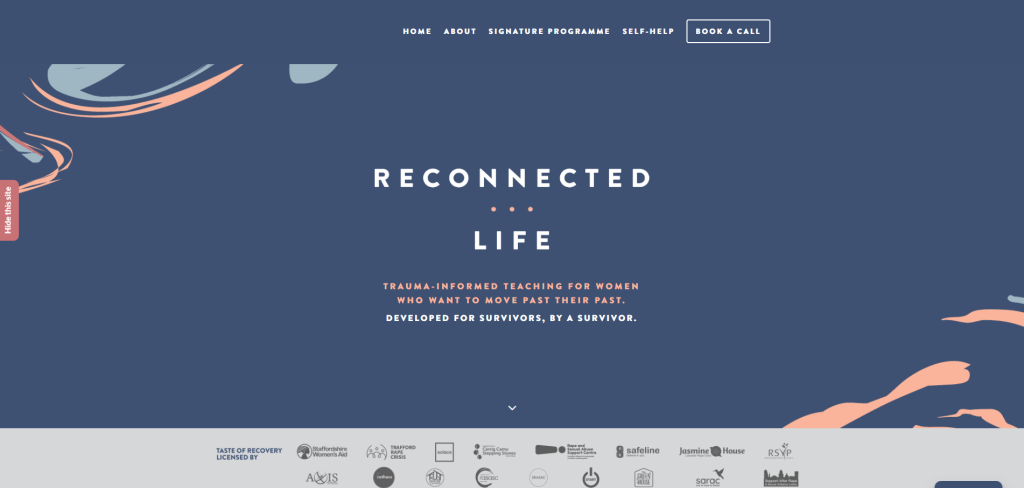
A website that magnetizes a specific target audience in a vulnerable, authentic way: ReConnected Life | Move Past Your Past
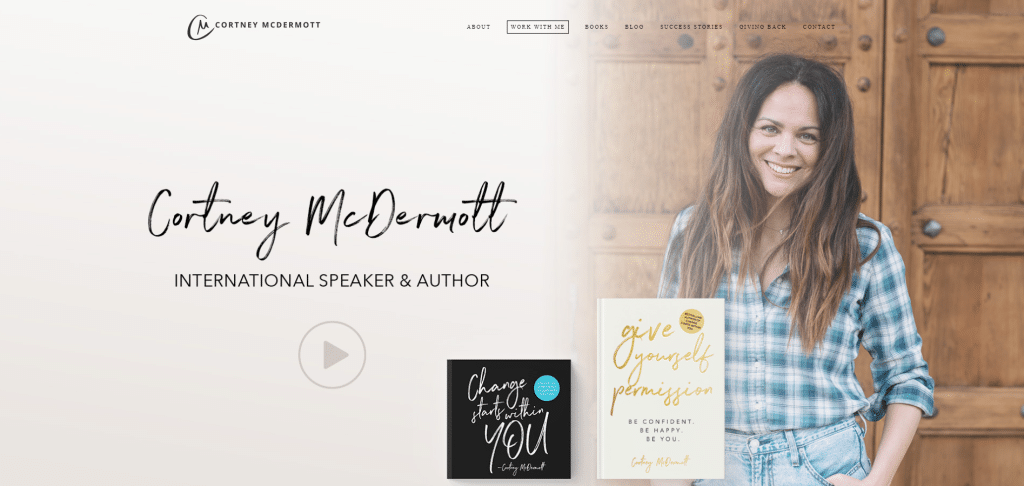
An “About” page that’s professional, personal, and impressive: About Cortney McDermott: Writer, Speaker, and Business-Life Strategist
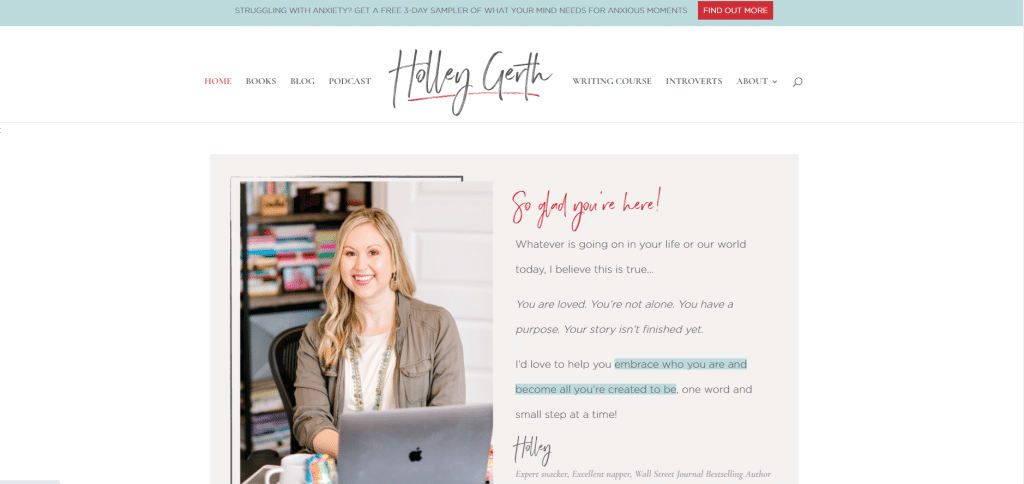
Personal, fun, and straight-forward, this website centers on the essentials and has an easy-to-follow home page: HOME – Holley Gerth

Simple and direct, this website makes it instantly clear who she helps and how: Gabby Bernstein: Author & Motivational Speaker
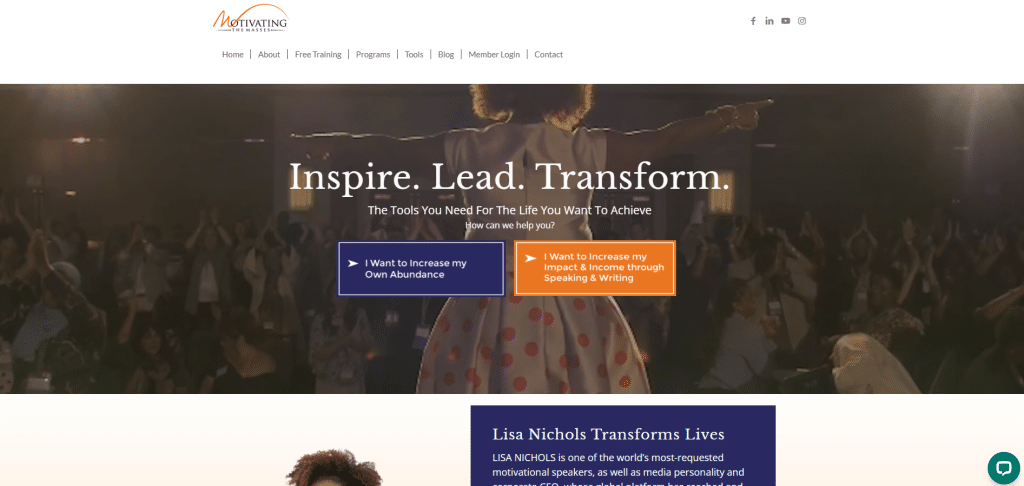
This is a great example of two clear calls to action that help you decide where to go right from the homepage: Lisa Nichols: Author & Motivational Speaker
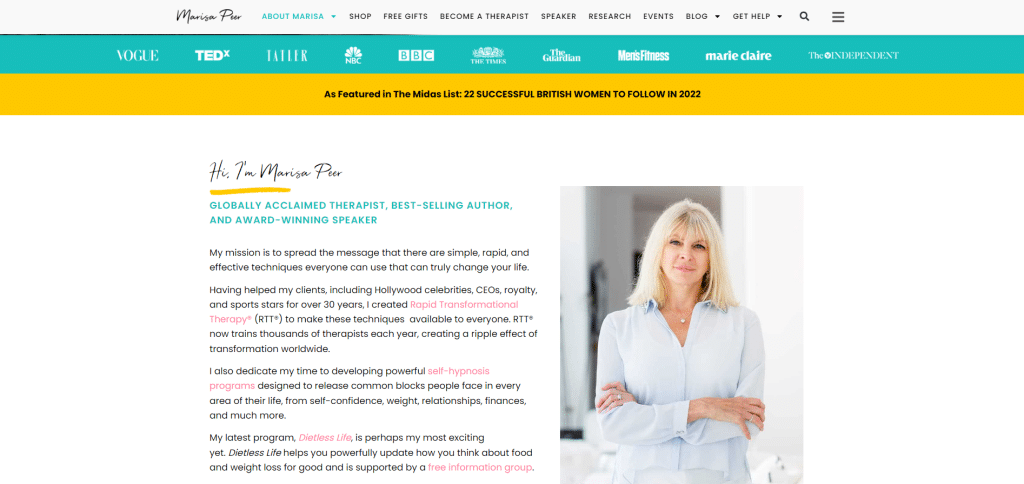
A creative “About” page that blends qualifications, mission, story, and testimonials: Marissa Peer: Speaker & Therapist

Clear branding, appealing design, and a clear promise. Her site is relatable and full of compelling social proof: Selena Soo: Publicity Coach
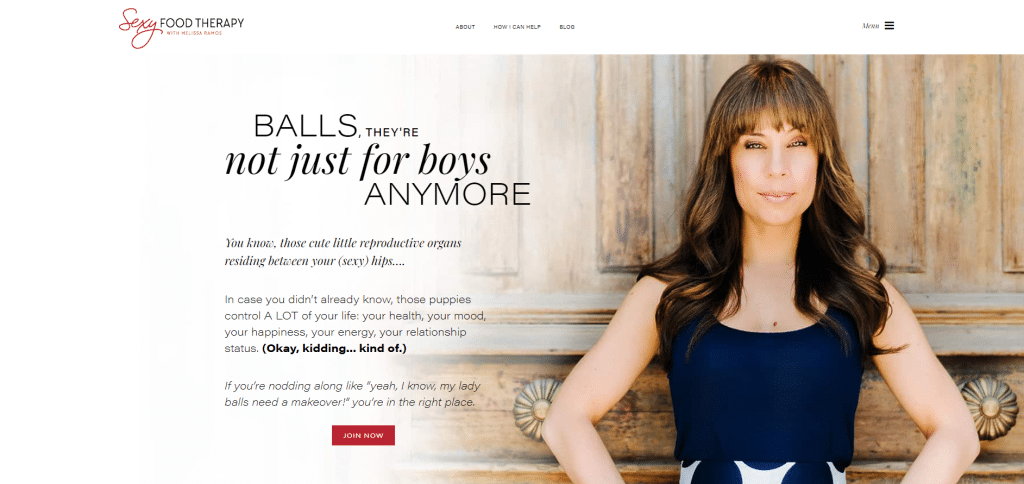
A health coaching website with beautiful design and engaging, funny copy that hits home for her audience: Melissa Ramos: Health Coach
Strategies to Promote Your Website and Attract More Clients
Launching your website and letting it sit on the internet isn’t the best strategy for building your business. It’s important to promote your site regularly and engage with your potential clients.
Here are some tips for getting started:
- Use social media platforms like Instagram, Facebook or Tiktok to share your life coaching website with others. Share valuable posts and services as well as relevant blog posts.
- Get creative with your marketing (without being complicated). Share a link to your website in your email signature and social media profiles.
- Create engaging content. Write blog posts that answer questions, offer free advice, and inspire. You can even collaborate with influencers and other coaches to increase your visibility through podcasts, video content, and speaking engagements.
- Host your own webinars, live events, workshops, and other events to draw in an audience, build authority, and present your offer.
- Create lead magnets that demonstrate your expertise and provide value. Include a form where visitors can request more information and join your email list.
- Promote your site using paid advertising. There are many opportunities to promote your site including Google Ads, Facebook ads, LinkedIn ads, YouTube ads, etc.
How Can AI Help You Build Your Website Even Faster & Easier?
If you’re comfortable with it, AI like ChatGPT can significantly streamline the process of creating your coaching website.
Here are five prompts you can use in ChatGPT to help you create a great coaching website with ease:
“About” Page Content Creation
“Can you help me draft an engaging ‘About Me’ page for my coaching website? I specialize in [specific coaching niche], and I’d like to convey my experience, qualifications, and personal approach to coaching.”
Blog Post Ideas and Drafting
“Generate a list of 10 blog post ideas suitable for my life coaching website that focuses on [specific areas like mindfulness, career advancement, personal growth, etc.]. Additionally, could you provide an outline for a blog post titled ‘[One of the generated ideas]’?”
Service Description and Packages
“Can you assist me in crafting descriptions for my coaching services? I offer [list your services, like individual sessions, group workshops, etc.]. Each description should highlight the benefits, process, and unique value of the service. Also, suggest a pricing structure that aligns with industry standards for these services.”
FAQ Section Development
“Can you help me create a FAQ section for my life coaching website? My coaching focuses on [specific areas], and I want to address common questions potential clients might have about my services, coaching process, and expected outcomes.”
Engaging Homepage Content
“I need captivating content for the homepage of my coaching website. The content should introduce my coaching philosophy, highlight my areas of expertise, and encourage potential clients to explore my services. Please include a strong call-to-action that guides visitors to contact me or book a session.”
Build Your Dream Website For Your Dream Clients
Your coaching business website is a valuable, powerful marketing tool in the online marketplace. It’s one of the few places where you can carefully (read: selectively) choose what others see and consume, unlike other platforms. People from all over the world can discover you, learn more about you, and connect with you, all with a click of a button (on a space you actually own).
And when done with intention, your website will help promote your services, build expertise, and attract your dream clients!
It’s natural to feel excited and inspired at this point, but you may also feel that there’s more to attracting clients than building a functional website.
Your gut feeling is right.
As powerful as a website can be on its own, there are ways to amplify and optimize the results you get out of it. If you’re interested in learning how to enroll even more new clients and seriously launch your career as a life coach, you’re in luck.
Discover how to network and promote your coaching business with this free gift:
>> Download “10 New Clients in 90 Days”
Get ready to take your life coaching business to the next level!






Leave a Reply